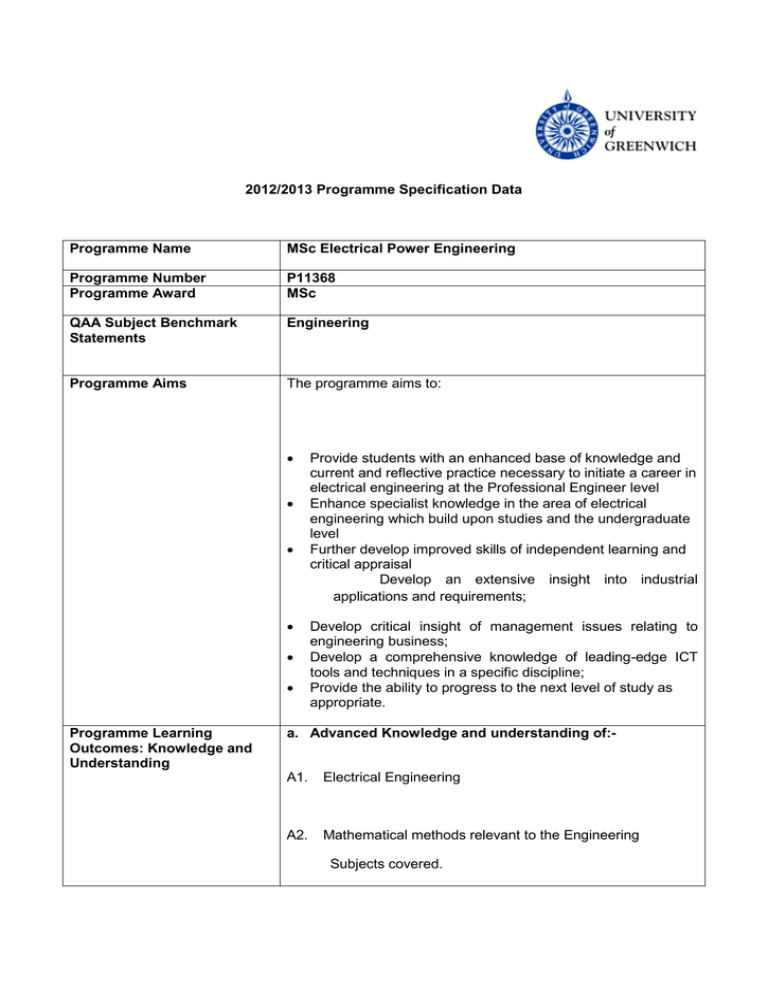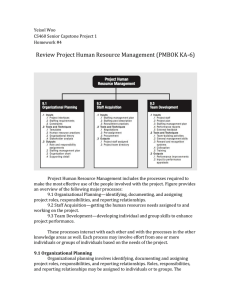2012/2013 Programme Specification Data Programme Name MSc
advertisement

2012/2013 Programme Specification Data Programme Name MSc Electrical Power Engineering Programme Number Programme Award P11368 MSc QAA Subject Benchmark Statements Engineering Programme Aims The programme aims to: • • • • • • Programme Learning Outcomes: Knowledge and Understanding Provide students with an enhanced base of knowledge and current and reflective practice necessary to initiate a career in electrical engineering at the Professional Engineer level Enhance specialist knowledge in the area of electrical engineering which build upon studies and the undergraduate level Further develop improved skills of independent learning and critical appraisal Develop an extensive insight into industrial applications and requirements; Develop critical insight of management issues relating to engineering business; Develop a comprehensive knowledge of leading-edge ICT tools and techniques in a specific discipline; Provide the ability to progress to the next level of study as appropriate. a. Advanced Knowledge and understanding of:A1. Electrical Engineering A2. Mathematical methods relevant to the Engineering Subjects covered. A3. A4. Systems approach to Electrical Engineering Leading-edge ICT to tools and techniques in a specific discipline A5. Techniques applicable to specific research and advanced scholarship A6. Industrial applications of Electrical engineering A7. Strategic and operational management issues and decision making relating to engineering business. A8. The global and social responsibilities of engineers and the Environmental impact of their activity. b. Intellectual Skills Programme Learning Outcomes: Intellectual Skills B1. Systematic understanding of Electrical engineering knowledge B2. Critical awareness of current problems and/or new insights in the electrical power engineering discipline B3. Critical appraisal of contributions of contemporaries B4 Critically evaluate engineering methodologies and where appropriate propose new hypotheses B5. Critically evaluate current research and advanced scholarship B6. Significant independent leaning B7. Originality in the application of knowledge Programme Learning Outcomes: Subject Practical Skills c. Practical Skills C1 Deal with complex issues in electrical power engineering both systematically and creatively C2. C3 Programme Learning Outcomes: Transferable/Key Skills Make sound judgements in the absence of complete data Demonstrate self-direction and originality in problem solving C4 Act autonomously in planning and implementing tasks C5 Communicate effectively to specialist and non-specialist audiences C6 Ability to continue to advance personal knowledge and understanding C7 Ability to develop new skills to a high level d. Transferable/Key Skills D1. Apply an systems engineering approach to the solution of complex problems. D2 Make decisions in complex and unpredictable situations D3 Use creativity and innovation in Problem solving. D4 Make management decisions at the strategic and operational levels D5 D6 D7 Programme Learning Outcomes: Graduate Attributes Teaching and Learning Methods Use leading ICT tools in electrical power engineering Exercise initiative and personal responsibility Ability for independent learning required for continuing professional development n/a A Teaching and learning: Acquisition of A1 and A2 is gained through formal lectures, small group seminars and laboratory exercises. Knowledge of A3 is implicit in all courses and is emphasised in assignments and case studies A4 is endorsed in formal lectures, laboratory exercises and case studies also specifically through the Programmable Analogue Electronics and Advanced Power Engineering courses and other options Acquisition of A5 is through the Research Methodology course, project work and assignments. Acquisition of A6 is through formal lectures, assignments case studies and project work Acquisition of A7 is through the Strategy and Management and further reinforced in most other course were relevant. Acquisition of A8 is from strategic examples in courses throughout the programme. Also specifically through optional courses in Environmental Engineering and Global Engineering. B Teaching and learning Acquisition of B1, B2, B3 and B4 is through the provision of intellectually challenging problems in all courses along with seminar support. Acquisition of B5, B6 and B7 is through assignments and case studies in all courses and specifically through the Research Methodology course and the Individual Project. C Teaching and learning Acquisition of C1 is developed through laboratory work, case studies, assignments and specifically through Advanced Power Engineering, Multiple Technology Integration and Project courses. Acquisition of C2 is through case studies, laboratory work and projects. Acquisition of C3 and C4 is mainly though the individual project. Acquisition of C5 is through presentations of assignments and case studies included in several courses including Multiple Technology Integration, Strategy and Management and Project courses. Learning skills for the acquisition of C6 and C7 are explicit throughout the programme and specifically in Research Methodology and the Individual Project D Teaching and learning Acquisition of D1, D2 and D3 is through solving problems and carrying out practical activities in the majority of courses throughout the programme. Acquisition of D4 is mainly through the Strategy and Management course and other optional management courses in the program D5 is implicit in all courses and specifically Advanced Power Engineering, Programmable Analogue Electronics and other options Acquisition of D6 is primarily through the Individual project and other project based coursework including group projects Acquisition of D7 through assignments, the individual project and the Research methodology course. Assessment Methods On the web


